May 19, 2024 | 02:07 GMT +7
May 19, 2024 | 02:07 GMT +7
Hotline: 0913.378.918
May 19, 2024 | 02:07 GMT +7
Hotline: 0913.378.918
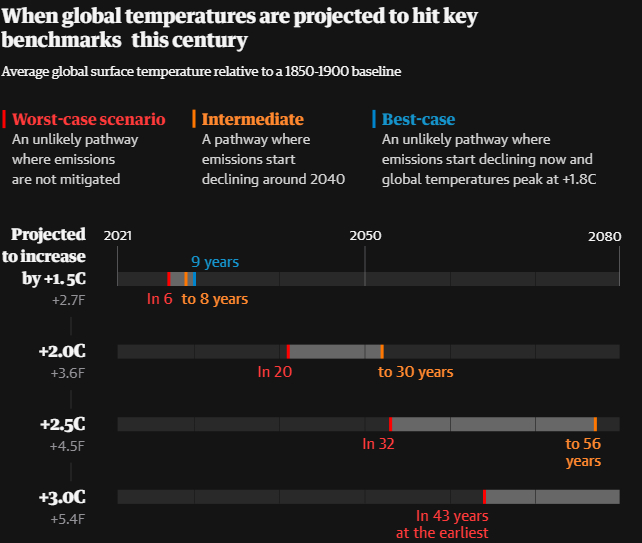
Summary for Policymakers. Note: The IPCC scenarios used for best-case, intermediate and worst-case scenarios are SSP1-2.6, SSP2-4.5 and SSP5-8.5. Source: IPCC, 2021
The enormous, unprecedented pain and turmoil caused by the climate crisis is often discussed alongside what can seem like surprisingly small temperature increases – 1.5C or 2C hotter than it was in the era just before the car replaced the horse and cart.
These temperature thresholds will again be the focus of upcoming UN climate talks at the COP26 summit in Scotland as countries variously dawdle or scramble to avert climate catastrophe. But the single digit numbers obscure huge ramifications at stake. “We have built a civilization based on a world that doesn’t exist anymore,” as Katharine Hayhoe, a climate scientist at Texas Tech University and chief scientist at the Nature Conservancy, puts it.
The world has already heated up by around 1.2C, on average, since the preindustrial era, pushing humanity beyond almost all historical boundaries. Cranking up the temperature of the entire globe this much within little more than a century is, in fact, extraordinary, with the oceans alone absorbing the heat equivalent of five Hiroshima atomic bombs dropping into the water every second.
Until now, human civilization has operated within a narrow, stable band of temperature. Through the burning of fossil fuels, we have now unmoored ourselves from our past, as if we have transplanted ourselves onto another planet. The last time it was hotter than now was at least 125,000 years ago, while the atmosphere has more heat-trapping carbon dioxide in it than any time in the past two million years, perhaps more.
Since 1970, the Earth’s temperature has raced upwards faster than in any comparable period. The oceans have heated up at a rate not seen in at least 11,000 years. “We are conducting an unprecedented experiment with our planet,” said Hayhoe. “The temperature has only moved a few tenths of a degree for us until now, just small wiggles in the road. But now we are hitting a curve we’ve never seen before.”
No one is entirely sure how this horrifying experiment will end but humans like defined goals and so, in the 2015 Paris climate agreement, nearly 200 countries agreed to limit the global temperature rise to “well below” 2C, with an aspirational goal to keep it to 1.5C. The latter target was fought for by smaller, poorer nations, aware that an existential threat of unlivable heatwaves, floods and drought hinged upon this ostensibly small increment. “The difference between 1.5C and 2C is a death sentence for the Maldives,” said Ibrahim Mohamed Solih, president of the country, to world leaders at the United Nations in September.
There is no huge chasm after a 1.49C rise, we are tumbling down a painful, worsening rocky slope rather than about to suddenly hit a sheer cliff edge – but by most standards the world’s governments are currently failing to avert a grim fate. “We are on a catastrophic path,” said António Guterres, secretary general of the UN. “We can either save our world or condemn humanity to a hellish future.”
Earth’s atmosphere, now saturated with emissions from human activity, is trapping warmth and leading to more frequent periods of extreme heat.
This year has provided bitter evidence that even current levels of warming are disastrous, with astounding floods in Germany and China, Hades-like fires from Canada to California to Greece and rain, rather than snow, falling for the first time at the summit of a rapidly melting Greenland. “No amount of global warming can be considered safe and people are already dying from climate change,” said Amanda Maycock, an expert in climate dynamics at the University of Leeds.
A “heat dome” that pulverized previous temperature records in the US’s Pacific northwest in June, killing hundreds of people as well as a billion sea creatures roasted alive in their shells off the coast, would’ve been “virtually impossible” if human activity hadn’t heated the planet, scientists have calculated, while the German floods were made nine times more likely by the climate crisis. “The fingerprint of climate change on recent extreme weather is quite clear,” said Michael Wehner, who specializes in climate attribution at Lawrence Berkeley National Laboratory. “But even I am surprised by the number and scale of weather disasters in 2021.”
After a Covid-induced blip last year, greenhouse gas emissions have roared back in 2021, further dampening slim hopes that the world will keep within the 1.5C limit. “There’s a high chance we will get to 1.5C in the next decade,” said Joeri Rogelj, a climate scientist at Imperial College London.
For humans, a comfortably livable planet starts to spiral away the more it heats up. At 1.5C, about 14% of the world’s population will be hit by severe heatwaves once every five years. with this number jumping to more than a third of the global population at 2C.
Beyond 1.5C, the heat in tropical regions of the world will push societies to the limits, with stifling humidity preventing sweat from evaporating and making it difficult for people to cool down. Extreme heatwaves could make parts of the Middle East too hot for humans to endure, scientists have found, with rising temperatures also posing enormous risks for China and India.
A severe heatwave historically expected once a decade will happen every other year at 2C. “Something our great-grandparents maybe experienced once a lifetime will become a regular event,” said Rogelj. Globally, an extra 4.9 million people will die each year from extreme heat should the average temperature race beyond this point, scientists have estimated.
At 2C warming, 99% of the world’s coral reefs also start to dissolve away, essentially ending warm-water corals. Nearly one in 10 vertebrate animals and almost one in five plants will lose half of their habitat. Ecosystems spanning corals, wetlands, alpine areas and the Arctic “are set to die off” at this level of heating, according to Rogelj.
(The Guardian)
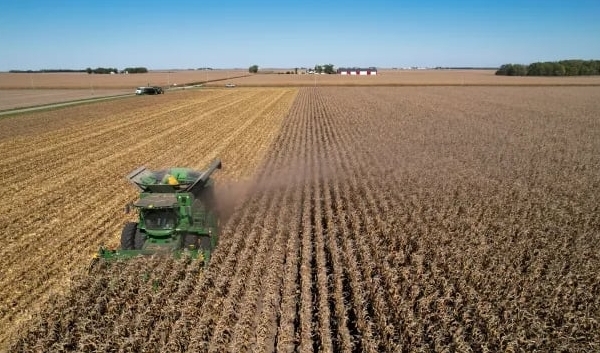
(VAN) Pharmaceutical, manufacturing and big agriculture interests have spent more than $400 million lobbying Congress on a new farm bill, a new report has found.
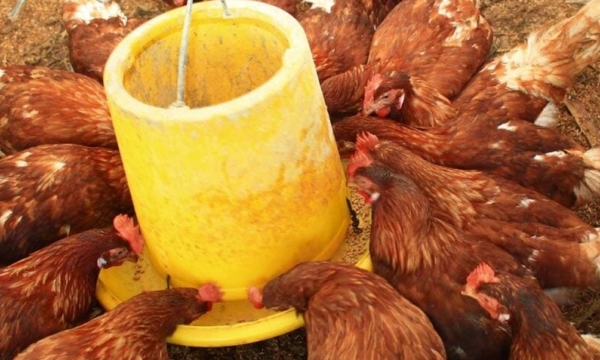
(VAN) RSPCA Assured has further extended its current pause on the introduction of new standards for laying hens, pausing its rollout for 9 months.
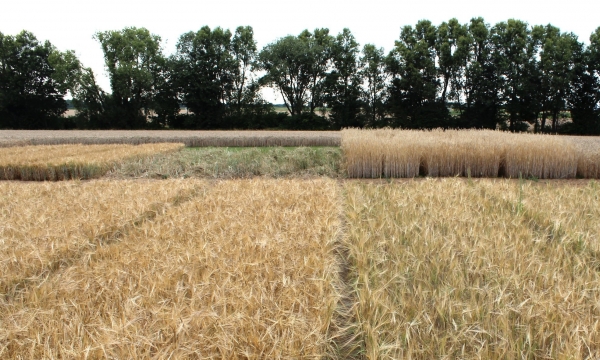
(VAN) Plants adapt genetically over time to the special conditions of organic farming. This has been demonstrated in a long-term study conducted at the University of Bonn.
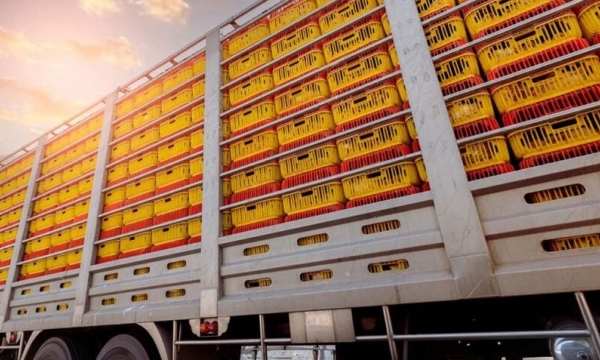
(VAN) Russia secured a spot among the top 3 largest poultry meat suppliers on the Chinese market in 2023.
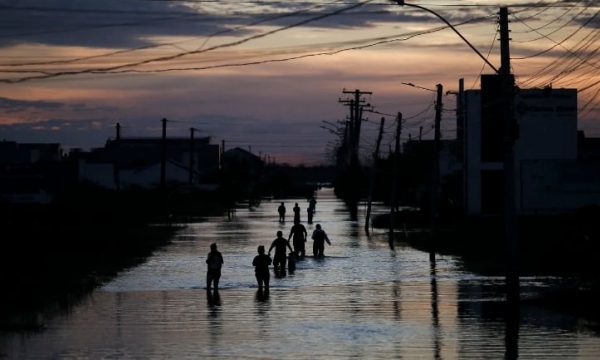
(VAN) A string of unprecedented weather and climate events has struck multiple continents in recent weeks, killing hundreds and displacing many more.
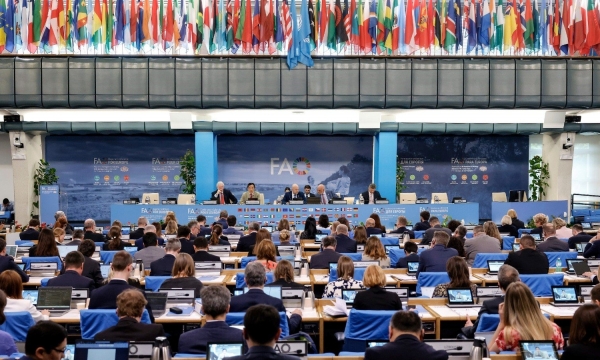
(VAN) FAO Director-General urges peace and digitalization as central to achieving the SDG agenda.

(VAN) The European Commission has approved the acquisition of sole control of East Grain of Romania by Agrofert of Czechia.